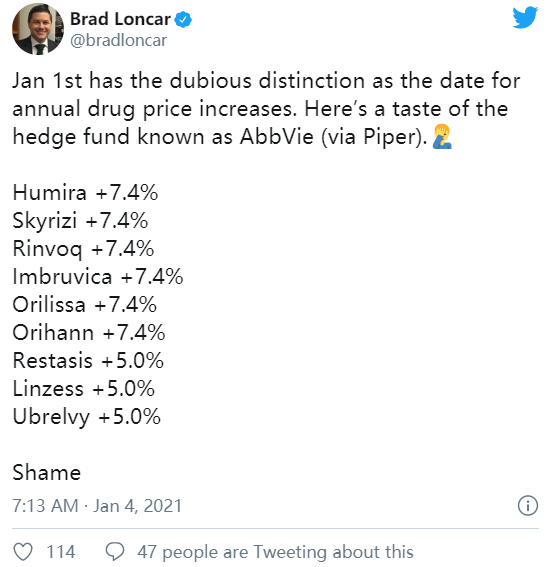開發(fā)新藥并不容易,,這是一個充滿巨大壓力,、不可預(yù)測的過程,,需要耗費大量精力。即便如此,,還是可能會讓全世界最偉大的科學家和他們所服務(wù)的患者在一瞬間希望破滅,。首次臨床試驗的成功,也可能迅速以慘敗收場,。
然而,,當艱難的藥物開發(fā)過程和制藥行業(yè)改變?nèi)松@一獨特的使命,遇到美國政府對于監(jiān)管藥價基本放任自流的態(tài)度,,事情就會陷入混亂之中,。在目前的系統(tǒng)下,無論某種藥品已經(jīng)上市了多長時間,,艾伯維(AbbVie),、輝瑞(Pfizer)、渤?。˙iogen)等業(yè)內(nèi)巨頭幾乎都可以在其定價方面一手遮天,。每年,制藥行業(yè)都在利用這種優(yōu)勢提高藥價,,2021年也不例外,。
以艾伯維為例。艾伯維在2019年通過一筆大宗交易,,收購了保妥適(Botox)生產(chǎn)商,,也是它的同行公司艾爾建(Allergan)。艾伯維生產(chǎn)的修美樂(Humira)是全球最暢銷的藥品,,僅2019年在美國的銷售收入就接近150億美元,。這種消炎藥物能夠治療牛皮癬、關(guān)節(jié)炎,、克羅恩病等多種疾病,。從這個角度來看,我們沒有理由對科學橫加指責,。但修美樂早在2002年12月就已經(jīng)獲得批準,。近20年后,艾伯維一直在提高這款藥品的價格,,盡管它的成分沒有發(fā)生任何變化,。
布拉德?隆卡是一位生物科技投資者,他和制藥行業(yè)及其創(chuàng)新活動關(guān)系密切,。但對這種為對沖科學失敗風險而一再提高成本的模式,,他也提出了批評。在艾伯維收購艾爾建時,,隆卡曾經(jīng)告訴《財富》雜志,,這種模式鼓勵金融工程而不是醫(yī)學奇跡,,而后者才是制藥行業(yè)賴以生存的核心。你知道修美樂的價格在2021年伊始已經(jīng)漲了多少,? 7.4%,。

對于這種情況,制藥公司的高管也束手無策,。制藥行業(yè)人士經(jīng)常辯解說,這種描述有失公平,,因為藥品的市場價格與醫(yī)院或保險公司或者患者支付的價格并不匹配,。
一名患者為藥品支付的實際價格取決于其保險狀況或大型制藥公司提供的支付計劃。除此之外,,你還可能會發(fā)現(xiàn)現(xiàn)有藥物的新用途,。修美樂這類藥物上市時可能只是針對一種疾病,但最終可能用于治療十多種疾病,。
這對普通美國人具有重要的財務(wù)影響,。美國退休人員協(xié)會公共政策研究所(AARP Public Policy Institute)和明尼蘇達大學(University of Minnesota)PRIME研究所(PRIME Institute)的數(shù)據(jù)顯示,即使在最新一輪漲價之前,,標準的40毫克修美樂注射筆的美國市場價(一年用量),,從2006年的16,636美元漲到了2017年的58,612美元。
除了隆卡,,生命科技領(lǐng)域的其他長期投資者也認為這種模式存在缺陷,。今年,渤健用于治療多發(fā)性硬化癥的藥物Tysabri也宣布了漲價,。
本文單獨提及的艾伯維和渤健已經(jīng)宣布了漲價的消息,,但其他許多公司也將遵循相同的模式。輝瑞,、賽諾菲(Sanofi)和葛蘭素史克(GlaxoSmithKline)都在醞釀漲價0.5%至8.6%,,包括這些公司的多款拳頭產(chǎn)品,例如輝瑞公司用于治療癌癥的Ibrance和消炎藥Xeljanz等,。(財富中文網(wǎng))
譯者:劉進龍
審校:汪皓
開發(fā)新藥并不容易,,這是一個充滿巨大壓力、不可預(yù)測的過程,,需要耗費大量精力,。即便如此,還是可能會讓全世界最偉大的科學家和他們所服務(wù)的患者在一瞬間希望破滅,。首次臨床試驗的成功,,也可能迅速以慘敗收場。
然而,,當艱難的藥物開發(fā)過程和制藥行業(yè)改變?nèi)松@一獨特的使命,,遇到美國政府對于監(jiān)管藥價基本放任自流的態(tài)度,,事情就會陷入混亂之中。在目前的系統(tǒng)下,,無論某種藥品已經(jīng)上市了多長時間,,艾伯維(AbbVie)、輝瑞(Pfizer),、渤?。˙iogen)等業(yè)內(nèi)巨頭幾乎都可以在其定價方面一手遮天。每年,,制藥行業(yè)都在利用這種優(yōu)勢提高藥價,,2021年也不例外。
以艾伯維為例,。艾伯維在2019年通過一筆大宗交易,,收購了保妥適(Botox)生產(chǎn)商,也是它的同行公司艾爾建(Allergan),。艾伯維生產(chǎn)的修美樂(Humira)是全球最暢銷的藥品,,僅2019年在美國的銷售收入就接近150億美元。這種消炎藥物能夠治療牛皮癬,、關(guān)節(jié)炎,、克羅恩病等多種疾病。從這個角度來看,,我們沒有理由對科學橫加指責,。但修美樂早在2002年12月就已經(jīng)獲得批準。近20年后,,艾伯維一直在提高這款藥品的價格,,盡管它的成分沒有發(fā)生任何變化。
布拉德?隆卡是一位生物科技投資者,,他和制藥行業(yè)及其創(chuàng)新活動關(guān)系密切,。但對這種為對沖科學失敗風險而一再提高成本的模式,他也提出了批評,。在艾伯維收購艾爾建時,,隆卡曾經(jīng)告訴《財富》雜志,這種模式鼓勵金融工程而不是醫(yī)學奇跡,,而后者才是制藥行業(yè)賴以生存的核心,。你知道修美樂的價格在2021年伊始已經(jīng)漲了多少? 7.4%,。
對于這種情況,,制藥公司的高管也束手無策。制藥行業(yè)人士經(jīng)常辯解說,這種描述有失公平,,因為藥品的市場價格與醫(yī)院或保險公司或者患者支付的價格并不匹配,。
一名患者為藥品支付的實際價格取決于其保險狀況或大型制藥公司提供的支付計劃。除此之外,,你還可能會發(fā)現(xiàn)現(xiàn)有藥物的新用途,。修美樂這類藥物上市時可能只是針對一種疾病,但最終可能用于治療十多種疾病,。
這對普通美國人具有重要的財務(wù)影響,。美國退休人員協(xié)會公共政策研究所(AARP Public Policy Institute)和明尼蘇達大學(University of Minnesota)PRIME研究所(PRIME Institute)的數(shù)據(jù)顯示,即使在最新一輪漲價之前,,標準的40毫克修美樂注射筆的美國市場價(一年用量),,從2006年的16,636美元漲到了2017年的58,612美元。
除了隆卡,,生命科技領(lǐng)域的其他長期投資者也認為這種模式存在缺陷。今年,,渤健用于治療多發(fā)性硬化癥的藥物Tysabri也宣布了漲價,。
本文單獨提及的艾伯維和渤健已經(jīng)宣布了漲價的消息,但其他許多公司也將遵循相同的模式,。輝瑞,、賽諾菲(Sanofi)和葛蘭素史克(GlaxoSmithKline)都在醞釀漲價0.5%至8.6%,包括這些公司的多款拳頭產(chǎn)品,,例如輝瑞公司用于治療癌癥的Ibrance和消炎藥Xeljanz等,。(財富中文網(wǎng))
譯者:劉進龍
審校:汪皓
Birthing a drug isn’t easy. It’s an intensive, unpredictable, and enormously stressful endeavor which can dash the hopes of the world’s greatest scientific minds and the patients they seek to serve. Initial clinical trial victories can quickly swerve into cataclysmic failures.
But that reality, and the unique nature of the pharmaceutical industry’s life-changing mission, gets messy when it mashes up against the largely laissez-faire attitude the U.S. government has toward regulating drug prices. The current system gives companies like AbbVie, Pfizer, Biogen, and all the titans of the industry nearly carte blanche on how to price their medicines, no matter how long ago they were created. The industry takes full advantage by hiking prices year after year, and 2021 is no different.
Consider AbbVie. The company, which acquired fellow drug firm and Botox maker Allergan in a 2019 megadeal, makes the world’s top-selling drug, Humira, which brought in nearly $15 billion in the U.S. alone in 2019. This anti-inflammatory medication treats a slew of diseases ranging from psoriasis to arthritis to Crohn’s disease. So there’s no reason to knock the science. But Humira’s first approval occurred way back in December 2002. Nearly two decades later, AbbVie is still hiking its price despite no actual change in what the drug actually is.
Brad Loncar is a biotech investor with an affinity for the industry and the innovation it breeds. He’s also a critic of a model that inherently incentivizes perpetual cost increases in order to hedge against the risk of scientific failure. It’s a model, as Loncar told Fortune during the time of the AbbVie-Allergan deal, which incentivizes financial engineering over the medical magic which is the beating heart of the industry. The latest Humira price hike for 2021? 7.4%.
This is the part of the story where pharmaceutical executives throw up their hands. The industry regularly argues this is an unfair characterization since list prices don’t match what a hospital pays, or what an insurer pays, or what a patient pays for a drug out of pocket.
The exact amount one is charged varies depending on your insurance status or payment programs set up by big drug companies. And, besides, you can learn new uses for an existing drug. A treatment like Humira which was launched to treat one condition may eventually treat a dozen.
That has serious financial implications for the average American. Even before this latest round of price hikes, the U.S. list price of the standard 40 mg Humira injectable pen ballooned from $16,636 for a one-year supply in 2006 to $58,612 in 2017, according to the AARP Public Policy Institute and the University of Minnesota’s PRIME Institute.
Alongside Loncar, other longtime investors in the life science community say the model is broken. Biogen is another offender this year with its treatment Tysabri, which is used for patients with multiple sclerosis.
While AbbVie and Biogen are being singled out for the price increases they have announced so far, plenty of other companies are following the same pattern. Pfizer, Sanofi, and GlaxoSmithKline are all plotting price hikes of anywhere between 0.5% and 8.6%, including for blockbuster medications such as Pfizer’s cancer drug Ibrance and its anti-inflammatory Xeljanz.






